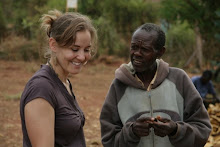Just a little reminder of how awesome this universe is.
Saturday, December 3, 2011
Thursday, December 1, 2011
World Aids Day: In Rememberance
I wrote this on April 18, 2007 while living in Kwa Zulu Natal, South Africa:
“There is not much talking now. A silence falls upon them all. This is no time to talk of hedges and fields, or the beauties of any country. Sadness and fear and hate, how they well up in the heart and mind, whenever one opens the pages of these messengers of doom. Cry for the broken tribe, for the law and the custom that is gone. Aye, and cry aloud for the man who is dead, for the woman and child bereaved. Cry, the beloved country, these things are not yet at an end. The sun pours down on the earth, on the lovely land that man cannot enjoy. He knows only the fear of his heart.”
-From Alan Paton's 'Cry the Beloved Country'
What is the meaning of a world where you welcome death for a child because it means the end of suffering - the end of knowing your mother has left you, of feeling too weak to play the games of the children around you, of finding the strength only to cry?
This is the face of AIDS in Africa. Of a child who came three weeks ago and whom I mistook for shy. A child who came in clean and pressed clothes and bright white tennis shoes that swallowed her stick-like legs.
“On admission to the center the child looked malnourished with very thin legs and arms and sunken eyes. According to the grandmother she does not like food, has diarrhea with blood, sweats at night and is restless.”
Her cries were the first I heard here – I went to investigate once when they seemed as though they’d never stop. And even with an arm around her bony back and her head on my knee, they continued. They were cries for which there could be no comfort.
On Saturday we invited her to hit the piñata, and gently took the bat when she broke into tears after one swing. The children shared their candy with her as she held back, as she always did, when they rushed forward to join the excitement.
Two days ago, she went to the hospital for the fifth time this year. She had no stuffed animal for comfort, it was insisted that anything of the sort provided would quickly be stolen in the night. Sister visited her and said she was worried. This morning the prognosis was better – she was smiling and talking to the nurse on duty. When Sister returned to see her after supper she was told she died in the afternoon. We learned her CD4 count this morning, it was 3.
I did not know her before I came here, nor any like her. She existed only in theory, in a far off land where the virus that killed her raged out of control. Then I came to Nkandla and I learned her name. I held her, I watched her, I worried after her and I got to know as much as I could of the shell that remained after three years of constant pain and illness.
Now I introduce her to you for this is all I can do – to offer a face and a name to that which we think we cannot know. This was Lindokuhle. From here on out, may this plague be considered a stranger no more.

In honor of World Aids Day, please consider contributing to The Africa Project, still hard at work with the Nardini Sisters in Nkandla.
Subscribe to:
Comments (Atom)

